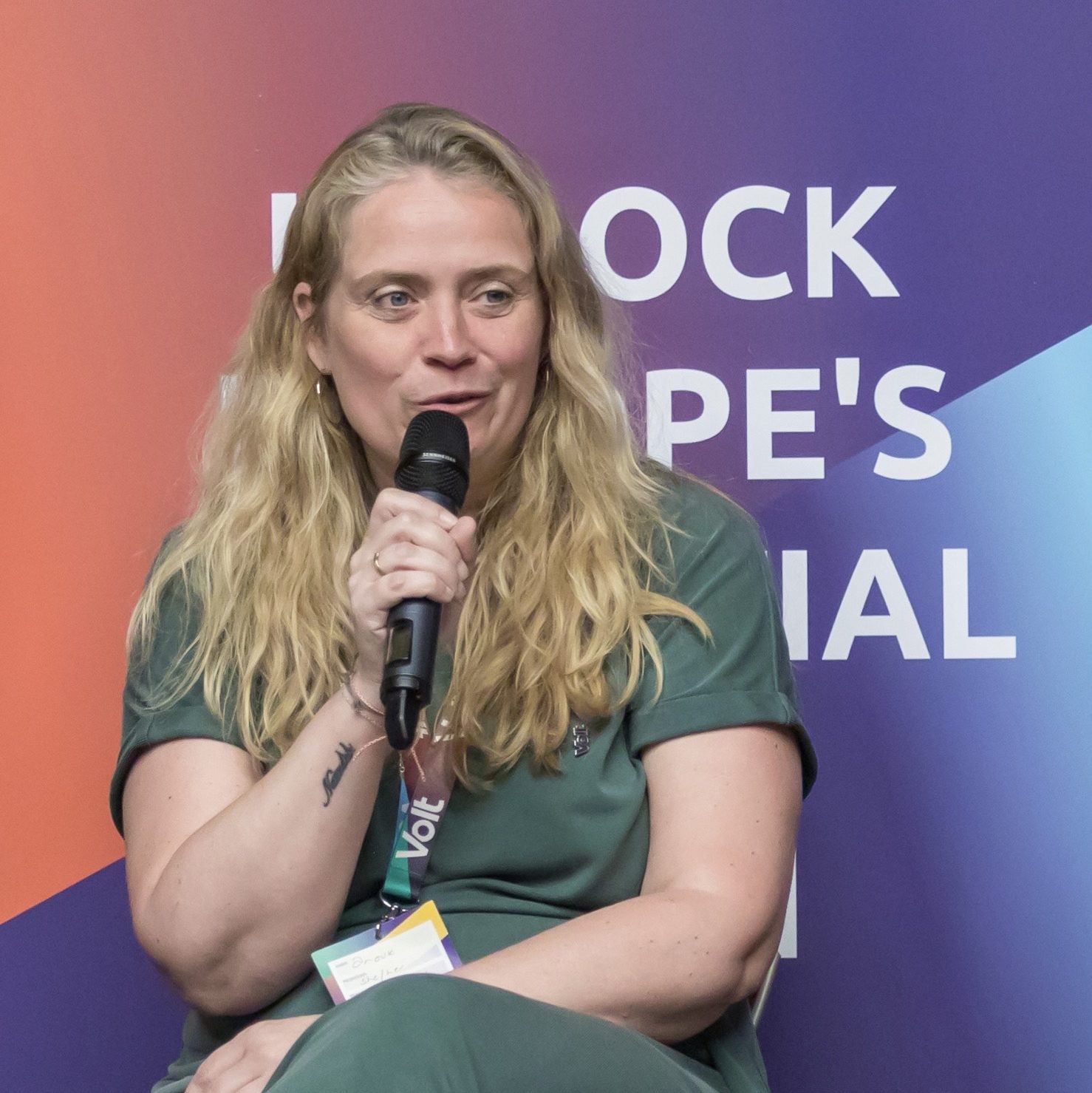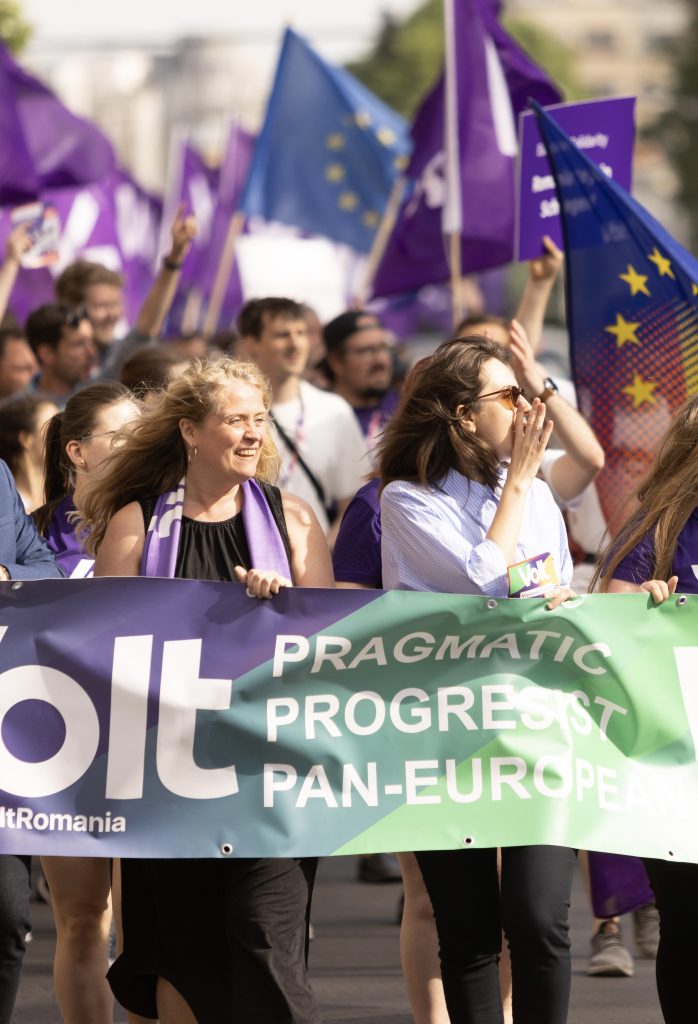Volunteers are the backbone of political initiatives, bringing passion, energy, and diverse perspectives that shape the course of movements. In a recent interview with Anouk Ooms, former General Secretary and Board member of Volt, we delved into the transformative power of volunteer-driven movements.
Ooms highlighted how volunteers are the driving force behind Volt’s success, propelling the movement forward and magnifying its impact on the European stage. Their unwavering dedication and commitment serve as a testament to the potential of grassroots activism, illustrating that collective action can ignite real change.

How did a group of young professionals come together to form Volt? Could you share the inspiring story behind the birth of this political movement?
Volt was born after Brexit where young Europeans believed that instead of creating divides, we should try to unite and solve our shared challenges together.
Drawing inspiration from their diverse backgrounds and experiences, these young professionals sought to bridge the gaps and create a pan-European political movement that transcended borders.
The birth of Volt was not without its challenges, as establishing a new political movement requires immense dedication and perseverance. Through their collective efforts, Volt gained traction and attracted individuals who were eager to challenge the status quo and make a difference. The movement grew rapidly, with chapters forming in various European countries and a shared commitment to transforming politics and shaping a better future for Europe.
Personally, I come from the NGO sector and went to different conferences about the Sustainable Development Goals. What I noticed was that most of the conferences discussed what these SDGs would bring to their own countries. It left me sad. Aren’t the SDGs exactly striving to bring us together to ensure a better future in the world?
That’s when I discovered Volt Europa. I was captivated by their commitment to changing the way politics is conducted and their genuine desire to unite rather than divide. The positive drive for change within Volt was truly inspiring. Bringing together like-minded individuals created an energy and motivation that fueled our efforts to make a difference. As the General Secretary, one of my key responsibilities was establishing the internal structure and teams that would collaborate effectively. We implemented a co-leadership model to ensure gender balance, which not only created diversity but also fostered an environment where young members could collaborate with seasoned veterans. This dynamic allowed for a valuable exchange of knowledge and ideas, with experience being challenged by fresh perspectives. It is this intergenerational learning and the willingness to challenge the status quo that fills me with pride. It reinforces my belief that we can genuinely transform the field of politics and approach it in a completely different way.
2. Volt is known for its unique way of embracing new talent, even those without prior political experience. How does Volt make sure that everyone, regardless of their background, feels included and valued within the party?
In my “normal” job outside Volt, I am a trainer in Diversity, Equity and Inclusion. One of my focus points is that organisations let real talent slip through their fingers as they fail to recognise their (unconscious) biases. We tend to look for what we recognise and recognise talent in what we know. Within Volt we want to do politics differently. That means that we seek a profile that stands out and differs from what is commonly assumed to be a good politician. Doing that consciously helps us to break through the status quo of what we call “old politics”. What we believe talent looks like is therefore not restricted to experience and with that having a certain age or background.
The talent we look for in people focuses on having fresh and constructive political ideas, a strong drive and the willingness to reflect. The latter is especially important because we will make mistakes while we find our way. Our way is not following a set path. Through mistakes we learn and grow. With this growth mindset, we ensure a way of working together within our movement that enables talents to thrive.
3. Volunteering seems to be a vital part of Volt’s ethos. Can you tell us more about the volunteer culture within Volt and how it contributes to the party’s growth and impact?
When I joined the movement, I was the first paid staff member. It was my task to set up the internal structures and teams to work together both on content as well as across Europe. I found it very inspiring to see how many people volunteered to dedicate their time to our movement. As such I also found it my responsibility that their time was well spent. Within Volt’s leadership that is the core of what we strive for our volunteers.
We create real positions to lead on specific topics when members have dedicated time available. This is a unique opportunity for young aspiring leaders to grow their personal competences and for experienced leaders to be challenged to become even better versions of themselves. For those that have less time available, we ensure that they have the opportunity to join teams and dedicate whatever time available to work on things that really interest them.
We can only achieve this through personal connection so we can manage expectations and bring them together. That is why when you sign up as a member, you are contacted personally. This is organised at the most accessible level where you hear what is going on with Volt in your city or region and how you can get involved. From there you are onboarded where you also hear what is happening in your country and eventually in Europe. Any contribution is valued. Every step we take together matters. This way everyone that dedicates their time as a volunteer, gets out of this experience what they strive for. That enables them to grow and enables us to have a real impact.
Regular communication channels are established to keep volunteers engaged and informed about Volt’s progress and achievements. By promoting transparency and acknowledging the impact of every volunteer’s contributions, we foster a collective spirit that drives our shared vision for a united and progressive Europe.
4. Creating a sense of unity and teamwork can be challenging, especially with members coming from diverse backgrounds. How does Volt foster a supportive and collaborative environment to bring people together?
We exist because we believe that only a Europe that acts together can solve our shared challenges. That is what is the core belief of our members across Europe and why members join our movement. This means that at its foundation, members want to make things work out together. Of course we also have challenges in doing so and to see eye to eye sometimes. It helps to remember everyone when needed, why we are here and why we work together.
Our teams work together across Europe by continuously making connections with National settings as none of our work stands alone. I would like to share the example of creating the European roadmap for the 2024 elections. We started with an open mind to listen to every country, what their political environment asks of them to become successful, what their needs are, what they can organise themselves and what our European team can contribute to. This creates the empowerment of each country to push for what they want themselves as well as enabling this to be amplified with the European team. After gathering all that information, we discussed with the European teams what is possible to offer ensuring that these needs and opportunities can really come together. Only then the European plan and roadmap really can unite Europe. The draft was then presented to all the National Boards and European Board to gather the final input before it was shared with all our members during our General Assembly in Prague last year. Now this is being executed from our unique Pan-European working culture enabling us to thrive across the continent in 2024.
5. In terms of diversity, how does Volt ensure that voices from different communities and underrepresented groups are heard and included in the decision-making process? Can you provide examples of initiatives or practices that promote diversity and inclusion within the party?
Politics traditionally attract academically educated white men. That is why we advocate internally for a clear dedicated strategy to attract and include diversity in our movement. If you do not consciously include, you unconsciously exclude. We can only represent society properly if society is reflected in our member base.
Across Europe we have launched the “purple project” that started with a survey amongst our members about diversity and inclusion. We have to acknowledge that we are not as diverse as we aspire to yet. What gives me hope is that our members indicated to be willing to give up something in order to let diversity thrive. A first, clear example of this being implemented is that during our last General Assembly in Bucharest, members approved enabling our Data Analytics team to conduct demographic analysis of our voting data to see how represented our voting is. This will give the European Board the opportunity to give more voice to underrepresented voices within our party.
Another important good practice that we have as Volt Europa is that we are not only a party. We are a movement. Not everyone joins us to become politically active. What unites us that we want change. That is why we include a focus on social innovation campaigns to also bring change to day to day life.
Lastly, citizen empowerment is one of our most important political visions for a united Europe. We believe that citizens should be able to participate in the decision making processes of our governments. One method to enable this is organising citizens assemblies, which we advocate for. In the Netherlands Volt recently launched a manifesto to create a permanent citizens assembly.

Stay in touch with PartyParty: our resourceful weekly newsletter keeps reporting on political changemakers, political parties, and political trends that are non-partisan, practical, and across borders.


